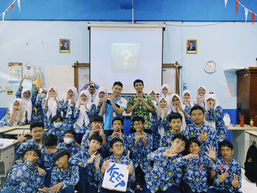measurement and evaluation
- FEB ANTHONY RIZANO
- Mar 4, 2025
- 2 min read
Updated: Mar 5, 2025
Assessment plays a crucial role in Indonesia’s education system which ensures that students not only acquire theoretical knowledge but also develop problem-solving skills. One of the assessment methods I observed in Ibu Ferra’s class was the regular checking of assignments, where she reviewed student work and recorded their scores. This formative assessment provides immediate feedback that allows both teacher and students to identify areas for improvement. The Indonesian education system values continuous assessment as a means to track student progress and guide instructional adjustments. By incorporating these evaluations into her lessons, Ibu Ferra ensures that students remain accountable for their learning while also providing them with opportunities to refine their understanding.

Beyond traditional assessments, Ibu Ferra also emphasizes authentic evaluation methods that measure students’ ability to apply mathematical theories in real-world situations. Authentic assessments, such as problem-based tasks and project-based learning, promote critical thinking and practical application. This approach aligns with Kurikulum Merdeka, which advocates for student-centered learning and real-life problem-solving. By integrating these assessments, Ibu Ferra ensures that students are not merely memorizing formulas but are actively engaging with the subject matter in a meaningful way.
Furthermore, the evaluation process in Indonesia often includes both individual and group-based assessments to foster collaborative learning. Students are encouraged to discuss solutions, share insights, and work together on mathematical problems. This reflects the country’s broader educational goal of cultivating teamwork, communication, and analytical thinking. By incorporating various assessment methods, Ibu Ferra not only measures academic performance but also helps students develop essential skills that extend beyond the classroom. Her approach highlights Indonesia’s commitment to a holistic education system that balances knowledge acquisition with practical application.











Comments